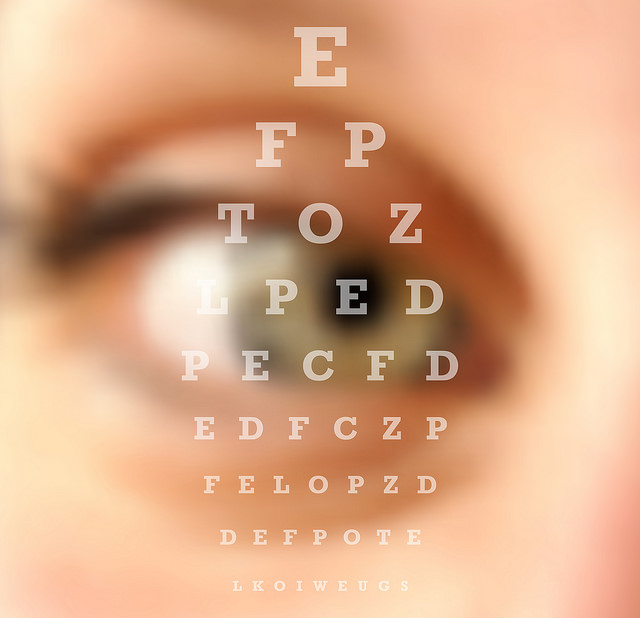
There are several causes of blindness but the leading causes include ocular complications of diabetes, macular degeneration, glaucoma, cataracts, and traumatic injuries. Other causes of blindness include vitamin A deficiency, retinopathy of prematurity, blood vessel diseases involving the retina or optic nerve including stroke, infectious diseases of the cornea or retina, retinitis pigmentosa, primary or secondary malignancies of the eye, congenital abnormalities, and hereditary diseases of the eye.
Cataracts
Cataracts occur when clouding occurs in the lens of the eye. This interferes with light reaching the retina, potentially causing blurry vision and other vision problems. The mechanics are explained below.
The lens is the clearer part of the eye that’s located behind the iris and pupil. It helps focus light onto the retina, which allows us to see clearly. The retina then converts light to electrical signals for the brain to decode into images. When a cataract begins to form and the lens is no longer clear, visual disturbances occur.
Common symptoms are:
- Blurry vision
- Colors that seem faded
- Glare
- Not being able to see well at night
- Double vision
- Frequent prescription changes in your eye wear
<h2> Glaucoma <h2>
Glaucoma usually happens when the fluid pressure inside the eyes slowly rises, damaging the optic nerve. There are no symptoms at first, but a comprehensive eye exam can detect it.
People at risk of glaucoma should get eye exams at least every two years, especially among African Americans and Hispanics over age 40, people over age 60 and people with a family history of glaucoma.
Macular Degeneration
Macular degeneration, also known as age-related macular degeneration (AMD), is a leading cause of blindness. It is a disease that destroys the sharp, central vision needed to see objects clearly. This affects the ability to read, drive, watch television, and perform daily routine tasks.
AMD affects the macula, the part of the eye that allows you to see fine detail. It does not hurt, but causes cells in the macula to die. In some cases, AMD advances so slowly that people notice minimal changes in vision. In others, the disease progresses faster and may lead to blindness in both eyes.
There are two kinds of AMD – wet and dry. Wet AMD occurs when abnormal blood vessels behind the retina start to grow under the macula. Dry AMD occurs when the light-sensitive cells in the macula slowly break down.
What Can You Do
Small preventative measures, like wearing sunglasses and eating greens, can help protect your eyesight and prevent vision problems later in life. Here is a list of five eye care tips that will help you protect your eyes and your vision for years to come.
Eat for Your Eyes
Eye health starts with a good diet. It’s not just carrots that help your eye sight — dark green leafy vegetables, fish, nuts and dark-colored berries all contain essential nutrients and antioxidants that will do wonders for your eyes. Vitamin A, for example, is commonly found in bright yellow and orange vegetables like carrots and sweet potatoes. Fruits like strawberries, oranges and mangoes provide vitamin C and other antioxidants, which also help fight eye disease. Salmon and other cold-water fish are also high in omega 3s — good for tear production, which relieves dry eyes.
Get Regular Eye Exams
It’s important to get regular checkups to catch any eye problems such as glaucoma or diabetic eye disease.
Apply the 20:20:20 Rule
Another tip for computer or any digital-screen users. Rest your eyes every 20 minutes by looking 20 feet away for 20 seconds. This exercise encourages the eyes to relax the muscles inside the eye to reduce fatigue. Another exercise is to look far away at an object for 10-15 seconds then gaze at something up; close for 10 to 15 seconds. Do these 10 times. This exercise will help reduce the risk of your eyes locking up after prolonged computer use.
Protect Your Eyes
Remember to always wear sunglasses that shield your eyes from 100 percent of the sun’s harmful ultraviolet rays when you’re outdoors during the daytime. This may help reduce your risk of cataracts, macular degeneration and other eye disorders.
Don’t Smoke
The many dangers of smoking have been well documented, especially when it comes to eye health. Smokers or people highly exposed to second hand smoke are at greater risk of developing age-related macular degeneration, cataracts, uveitis and other eye problems.
Schedule a Consultation
If you have further questions regarding the causes of blindness, do not hesitate to join us at Laser for Eyes for an expert consultation on our services. We will discuss and review your options to help you find the perfect fit for you. Schedule a consultation with us today, and join our many satisfied patients.
